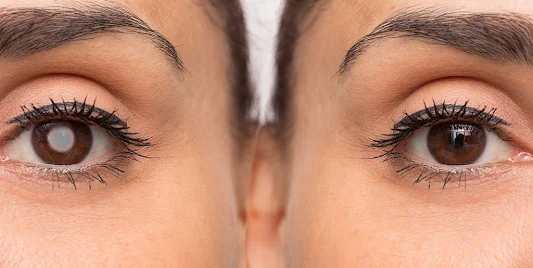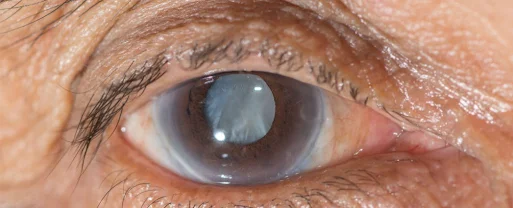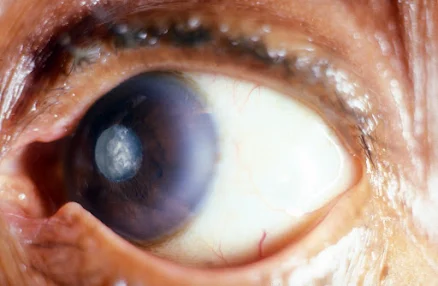How to Get Rid of Cataract Naturally: Is it Possible To Treat Cataract Without Surgery?
Most cataracts develop slowly over time and are a natural result of aging. Once cataracts become large enough that vision loss interferes with everyday activities, such as driving, reading, or watching television, they should be surgically removed.
Cataract removal is one of the most common operations performed in the United States. According to the National Eye Institute, roughly 90% of people who have cataract surgery have better vision afterward.
RELATED: Can Cataracts Be Reversed Without Surgery? – Is it Possible to Get Rid of Cataracts Naturally?
Signs and Symptoms of Cataract
- Decreased or blurred vision, often described as a fog
- Double vision
- Halo around lights
- "Second sight." When a person who normally wears reading glasses can suddenly read without them.
- Brown spots in the visual field
What Causes Cataract?
A cataract develops when protein in the lens clumps together and blocks light from reaching the retina. Researchers do not know what causes these proteins to clump together. But some think that cataracts may develop due to chemical changes in the lens that happen as people get older. Other researchers believe that there may be several causes of cataracts, including smoking, diabetes, and excessive exposure to sunlight.
There are four different types of cataracts.
- Age-related cataracts
- Congenital cataracts that are present at birth or develop in early childhood, usually in both eyes
- Secondary cataracts that develop in people with medical conditions (such as diabetes) or in those who use steroids
- Traumatic cataracts that develop as a result of an eye injury
Who is Most at Risk?
The following factors may increase a person's risk for developing cataracts:
- Being older than 50
- Being a woman
- Genetic diseases, such as Down syndrome
- Certain medications, such as steroids
- An infection, such as rubella, during pregnancy
- Taking drugs during pregnancy
- Radiation therapy during pregnancy
- HIV
- Celiac disease
- Metabolic disorders, such as diabetes
- Eye disorders, such as glaucoma
- High-voltage electrical injury
- Smoking
- Excessive exposure to sunlight
- Elevated body mass index (BMI)
A comprehensive treatment plan for cataracts may include a range of complementary and alternative therapies.
While there are no supplements that will improve cataracts once you have them, eating more antioxidant-rich foods may help you maintain good eye health. Try green, leafy vegetables, peppers, cherries, and berries, such as blueberries, blackberries, and raspberries. Berries contain high levels of beneficial antioxidants for eye health.
There has been some study of antioxidants in the diet, too. In one study, researchers found that higher dietary intakes of lutein (found in green vegetables, egg yolks, squash, corn, grapes, and orange juice) and vitamin E from food and supplements significantly reduced the risk of cataracts during the 10-year study period. However, there is no proof that taking these nutrients in supplement form will help. In fact, one study found that high-dose vitamin C and high-dose vitamin E increased the risk of age-related cataracts.
In another study, people who ate more foods with protein, niacin, thiamin, riboflavin, and vitamin A had fewer cataracts than those who ate less of these nutrients. Niacin, thiamin, and riboflavin are B vitamins. Again, the study looked at people who got the nutrients through food. Researchers do not know whether taking any of these vitamins as a supplement would help reduce the risk of cataracts.
The use of herbs is a time-honored approach to strengthening the body and treating disease. However, herbs can trigger side effects and can interact with other herbs, supplements, or medications. For these reasons, you should take herbs with care, under the supervision of a health care practitioner.
You may use herbs as dried extracts (capsules, powders, or teas), glycerites (glycerine extracts), or tinctures (alcohol extracts). Unless otherwise indicated, make teas with 1 tsp. of herbs per cup of hot water. Steep for 5 to 10 minutes for leaf or flowers, and 10 to 20 minutes for roots. Drink 2 to 4 cups per day. You may use tinctures alone or in combination.
Cataract is a medical condition in which the lens of the eyes becomes opaque resulting to poor sight.
It happens to mostly adults of above 40years and my advice to everyone is that, one should start applying this measure described below even when the symptoms are yet to manifest.
How to Get Rid of Cataract Naturally?
This is how to get rid of it using natural therapy:
Apply the juice of ALOE-VERA (Gel) to the affected eyes every night until the problem is over. (Health Benefits Of Aloe Vera)
READ MORE: How To Use Basil Leaves For Eye Health













Amazing facts👍👍💥💥 thanks very much 🤝🤝